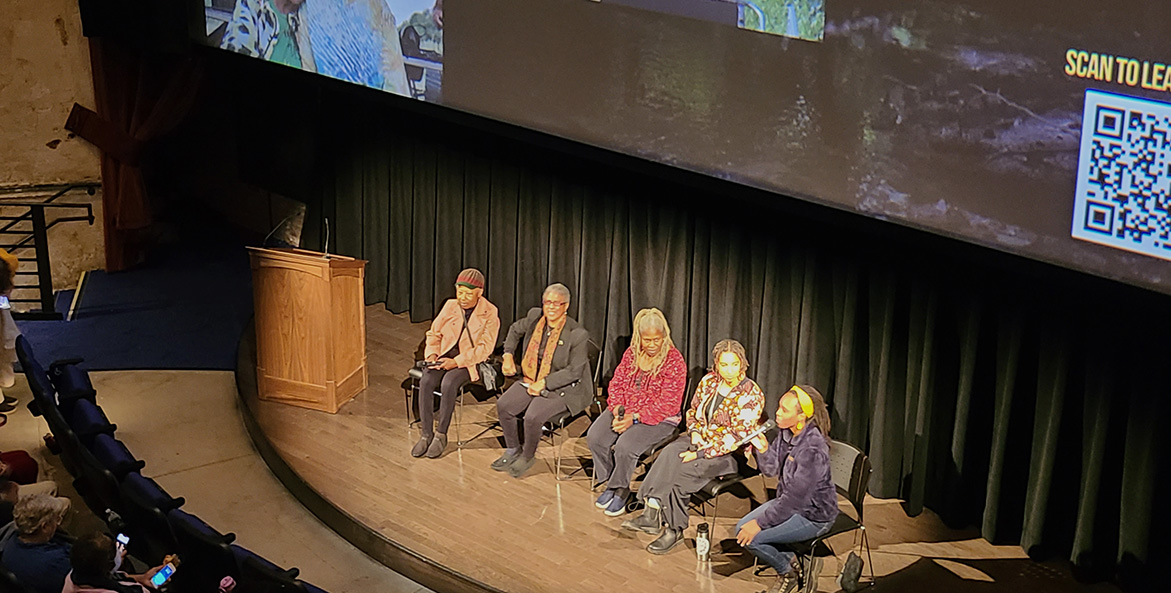Digging in the dirt makes Paulette Greene feel proud. “It’s an honor to provide people with quality food,” Miss Paulette said to an entranced crowd one November night at the Parkway Theatre in Baltimore.
Paulette was a panelist at the recent Firmly Planted film screening hosted by the Farm Alliance of Baltimore. She was among several other inspiring Black female farmers, including her long-time love and partner, Donna Dear. Paulette and Donna—more affectionately known as “The Aunties”—own and steward a 111-acre farm on Maryland’s Eastern Shore. The property was formerly the Thompson plantation where Harriet Tubman’s parents were enslaved. It is still home to the “Witness Tree,” where Tubman herself led formerly enslaved individuals north via the Underground Railroad.
Today, the Aunties use their farmland to feed and teach. They’re showing the next generation of farmers how to grow healthy food and preserve an important and often untold part of American history—a Black history that extends beyond bondage and sharecropping.
At the November film screening, audience members watched Paulette and Donna’s powerful story unfold in a short film appropriately titled The Aunties. It preceded another inspiring movie by director Mark Decena called Farming While Black. Both films explored the unique experiences of Afro-ecology and regenerative agriculture through the Black cultural experience.
“It was a film made for us,” said Karen Washington, a farmer from the Bronx featured in Farming While Black.
Leah Penniman, the film’s star and owner of Soul Fire Farm in Albany, New York, said that although she’s shy and being filmed was a challenge, she has “learned the imperative of sharing our story,” so that others can connect and continue the legacy.
During the event, the panelists were asked what advice they would give to the next generation of Black farmers. Auntie Donna said, “Know your history, capture the stories of your elders, and if your family has land, hold onto it because that is your legacy.”
Land values have skyrocketed on Maryland’s Eastern Shore, the Aunties explained. Maintaining their farms amid rising property taxes has presented a huge challenge, forcing many Black families to sell and lose land that their ancestors stewarded for hundreds of years.
Black farm ownership is at a fraction of what it once was. Its peak was in the 1920s, when African Americans made up about 14 percent of all growers. Historic racism, injustice, and violence took much of that away. Today, according to the latest U.S. Department of Agriculture census, over 95 percent of U.S. farmers are white.
Part of Leah Penniman’s mission at Soul Fire Farm is to restore Afro-Indigenous farming practices and end food insecurity resulting from systemic historical, political, social, and economic inequality..
Regenerative agriculture, a farming method that retains soil health and is beneficial to the environment, has been practiced by Indigenous and African cultures for centuries. Today, farmers across the Mid-Atlantic region use regenerative farming practices, such as rotational grazing and cover crops, to improve water quality in the Chesapeake Bay.
“We have a place in farming,” Penniman said in Farming While Black. “Our ancestors have laid the path.” Now, these women are focused on empowering and equipping others—building communities and sharing their stories to preserve and grow a legacy. Farm collectives like the Farm Alliance of Baltimore, and land stewardship programs, can be excellent resources for collaboration.
As Auntie Donna said, “If there’s no table to sit at, build your own.”
I’m just proud that we were given the opportunity to host such a powerful event. It was a beautiful evening,” said Denzel Mitchell, the Farm Alliance’s executive director said.
The audience snapped and cheered. Many in the crowd would be returning home to their farms that evening, inspired by what they watched and heard. It’s exciting to consider what they might do next to build resiliency in their communities.
More Resources:
- For Black Farmer priorities, visit the Federation of Southern Cooperatives;
- Learn about Black land sovereignty at Black Farmer Fund;
- To support Afro-Indigenous Food Sovereignty, visit Soul Fire Farm, Black Dirt Farm Collective, and Rise & Root Farm;
- Explore the deep roots of regenerative agriculture; and
- Watch The Aunties and Farming While Black to learn more!




